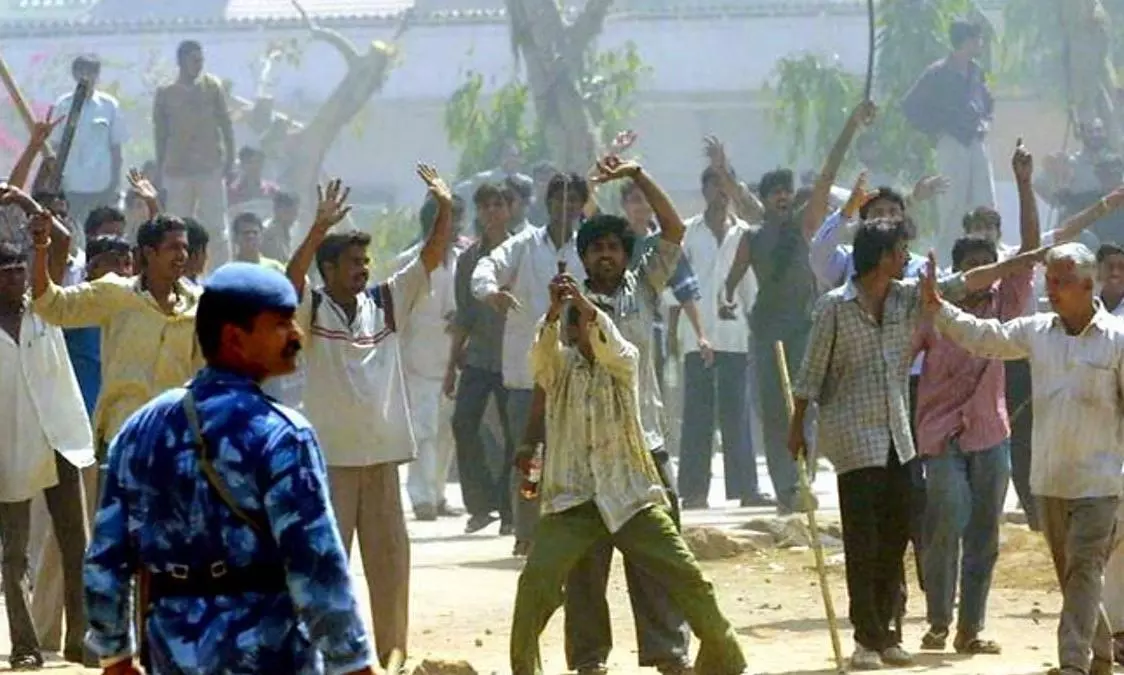
3 convicted of attacking Muslims during 2002 Gujarat violence exonerated as HC doubts witness
text_fieldsThree men who were convicted of attacking Muslims during the 2002 Gujarat violence have been exonerated after the Gujarat High Court found that the prosecution had failed to conduct a Test Identification Parade (TIP) and expressed doubt over the dock identification by a key prosecution witness, with five of the nine accused having already been acquitted by the trial court.
The trial court had convicted four of the nine accused and acquitted the remaining five, but the High Court, after a detailed re-examination of the evidence, concluded that the convictions could not be sustained due to procedural lapses and inadequate identification, according to Live Law.
Justice Gita Gopi allowed the appeals filed by Sachinbhai Hasmukhbhai Patel, Ashokbhai Jashbhai Patel, and Ashok Banarasi Bharatbhai Gupta, who had earlier been sentenced to five years’ imprisonment under Section 149 of the Indian Penal Code (IPC) for being part of an unlawful assembly, and six months under Section 147 for rioting.
The High Court noted that the prosecution’s case rested primarily on the testimony of a single witness, identified as Prosecution Witness 3 (PW3), but found inconsistencies in his statements and the lack of corroborative evidence that could have strengthened the prosecution’s claims.
The case related to an incident in Lotia Bagod in Anand district on 1 March 2002, when the accused were alleged to have participated in a mob that set fire to several shops in retaliation for the Godhra train burning incident.
The court observed that the prosecution had failed to conduct a TIP despite the accused being unknown to the witness, and held that the dock identification in such circumstances could not be considered conclusive unless the witness’s evidence was of an exceptional standard.
The court further remarked that the prosecution had not clarified how PW3 recognised the accused from a crowd of over a hundred people, nor had he described their roles or the weapons allegedly carried by them, which was particularly important given that charges under Section 148 of the IPC, relating to rioting with deadly weapons, had also been invoked.
In its 98-page judgment, the High Court stressed that the legal definition of an unlawful assembly required clear evidence that each accused shared a common object and actively participated in acts of violence. It pointed out that the mere presence of an individual in a large crowd could not be the basis for criminal conviction unless the prosecution could establish a specific role or intention.
The acquittals come against the backdrop of the 2002 anti-Muslim violence in Gujarat, in which nearly 3,000 people were killed and thousands more displaced. The riots, which followed the Godhra train fire that killed 59 Hindu pilgrims, saw mobs affiliated with groups such as the Vishva Hindu Parishad, Rashtriya Swayamsevak Sangh, and the Bharatiya Janata Party carry out widespread attacks on Muslim homes, businesses, and places of worship, amid allegations of state complicity and police inaction.
While the High Court’s ruling addressed only one case from the period, it highlighted the challenges in securing convictions in riot-related cases where procedural irregularities and weak evidence continue to undermine the judicial process.


















